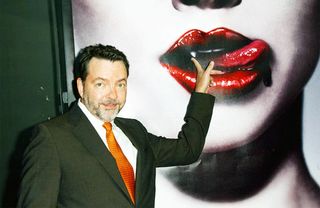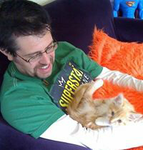He wrote the Oscar-winning movie American Beauty and created the hugely successful TV show Six Feet Under, but now Alan Ball is known best for True Blood . He tells SFX why sex isn’t a bad thing, and why it’s so intrinsic in his vampiric show…

Is it getting more difficult to build the suspense in the show, because you know that people have read the books and are way ahead of you?
I can’t worry about that. I just have to create a show and assume that people are seeing it for the first time. We also make changes from the books, so it’s not exactly as it happens in the books.
Does that make it difficult for you? Obviously for Six Feet Under they were all your original ideas – was that easier?
In a lot of ways, it’s easier because a lot of the heavy lifting has been done. But then it is more difficult because you can’t just go in any direction because you know that you have to remain true to a certain extent to the world of the books, because for the most part the fans of the books are fans of the show. I don’t really think a lot about outside influences, I don’t think about what the fans of the books think about the show. I don’t go on the web, I don’t read the chat, the boards, I don’t do any of that stuff. The only way I know how to do it is try to make a show that I would watch, that I would enjoy and be entertained by.
You’ve talked before about getting one “WTF?” moment in every episode. What else is left there for a groundbreaking show like True Blood to do?
I don’t know. I think we can tell pretty much any story we want to tell without getting… it’s not pornography. I guess that would be a boundary that could be broken. I think the ultimate boundary is a reality show where if you lose you get killed, and actually, I watch some of the reality shows, and I would rather watch the one where someone gets killed. If I could watch The Batchelorette and every episode she chose one of them to shoot, I would be there every week.
But one of the things that draws people into your show is the amount of sex. Is it getting a bit close to porn?
Well, I think pornography is about body parts. Art is about souls. I am not saying that True Blood is art, but I’m saying that we’re not about the body parts, it’s about the relationships. Part of what I loved about the books was that they were such a great mixture of horror and romance and drama and hilarious comedy and sex and violence, and it’s all wrapped up together. Those books are pretty sexy. Ultimately, when you think about vampires, vampires basically are sex.
Do you think it’s been a benefit to the show to have as much sex as it does have in it?
Well, I think the sex in the show is organic to the characters and their emotional lives. I mean, Sookie was a virgin at the beginning of the series because she couldn’t have sex with someone because she could hear their thoughts, so the sex between her and Bill is a big part of her emotional story. Again, with Jason, he’s sexually compulsive, so that’s going to be a big part of the story. And part of what appealed to me about the fact that the show was set in a small town in the South – and I’m from a small town in the South – is how when you have that small town puritanical stuff on top of the sex, the stuff that’s really going on is really that much more heightened and crazy because people just can’t acknowledge it. Americans are really uptight about sex.
When do you think that vampires stopped being those dark, horror characters and started becoming these brooding, romantic characters that they are now in movies?
Christopher Lee was scary. Yeah, they were never the romantic heroes, they were always the monster. A lot of people say that it was soap opera Dark Shadows , but certainly the Anne Rice books and the Frank Langella production on Broadway in the ’70s. I think there was a point where they became romantic heroes, like tortured, reluctant vampires, I think that was where the turn happened.
Does the fact you are gay help make the show more progressive and liberal?
I definitely think it influences me. I don’t totally identify myself as gay, because I’m gay, yes, but I’m also male, I’m white and I’m an American – all of these things are true – but ultimately I just think I’m a human, I’m a person. But definitely the way I approach gay characters is probably different, because I am less inclined to say, “Oh, Lafayette, he’s the gay one.” It’s more about what makes him who he is, because to me, just being gay is not enough for a character. It’s not that interesting.”
Words by Sarah May. This is an extract of an interview in the new SFX True Blood/Vampire Special , on sale now. Read the whole interview there, along with all sorts of other great Bon Temps fabulousness. Catch True Blood on FX every Friday at 10pm.

